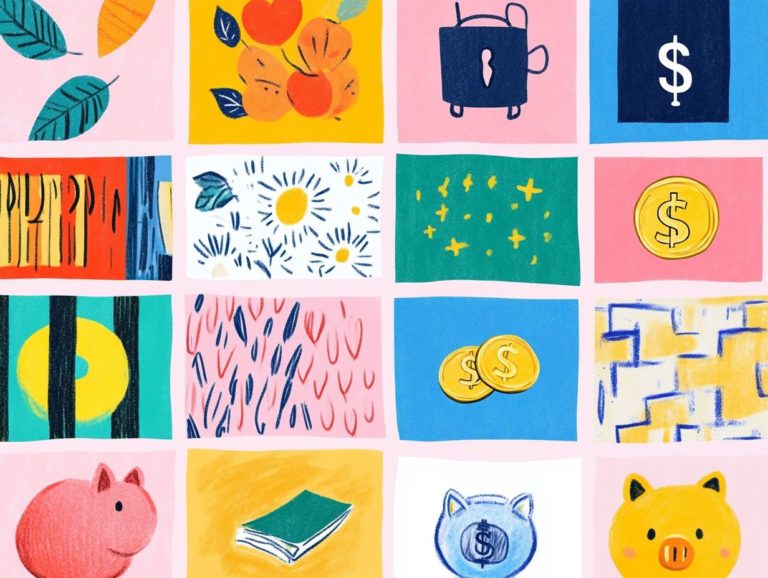How to Budget for a New Baby: Key Tips
Welcoming a new baby marks the beginning of an exhilarating journey, brimming with joy and anticipation. Yet, it also introduces a range of money matters you need to handle.
From diapers to doctor visits, grasping the costs involved is essential for you as a new parent. This guide outlines the key expenses you ll encounter, offers practical tips for planning your spending, and presents strategies to help you save money effectively.
This guide also helps you prepare for unexpected costs that may arise. Immerse yourself in this guide to equip yourself with the financial savvy needed for this transformative chapter in your life!
Contents
- Key Takeaways:
- Preparing for a New Baby: The Financial Aspect
- Essential Expenses for a New Baby
- Additional Expenses to Consider
- Creating a Budget for Baby
- Ways to Save Money on Baby Expenses
- Planning for Unexpected Expenses
- Frequently Asked Questions
- What are the essential expenses to consider when budgeting for a new baby?
- How can I save money on baby essentials?
- What are some ways to cut costs when preparing for a new baby?
- How can I create a realistic budget for my new baby?
- What are some potential unexpected expenses to consider when budgeting for a new baby?
- How can I stick to my budget once the baby arrives?
Key Takeaways:
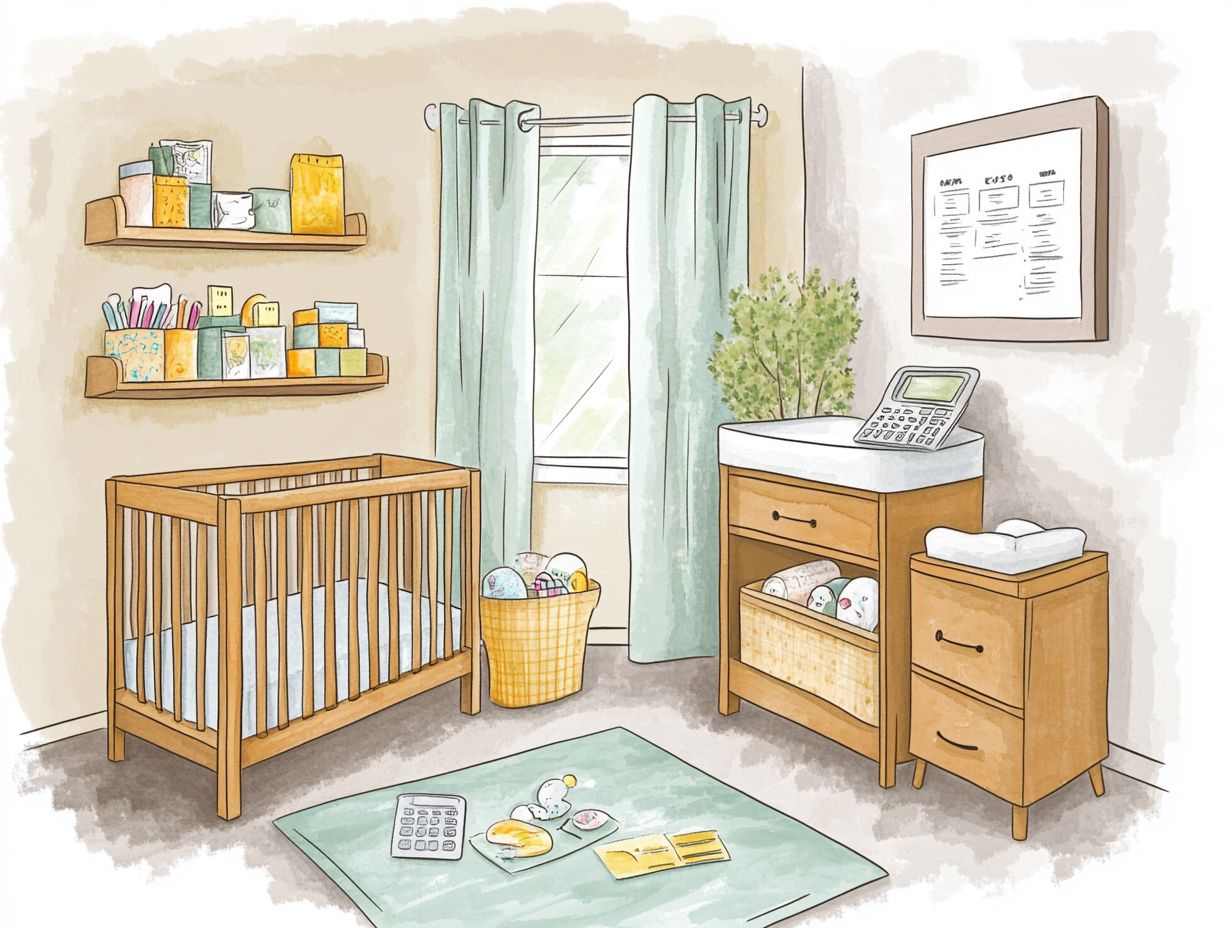
- Planning your spending is vital when getting ready for a new baby. It helps you manage the financial responsibilities of parenthood.
- When creating a budget for your baby, consider essential expenses like diapers, formula, and clothing, but also think about additional costs such as childcare and medical expenses.
- To save money on baby expenses, try cutting costs by purchasing second-hand items, stocking up on essentials when they’re on sale, and utilizing free resources like mom groups and libraries.
Preparing for a New Baby: The Financial Aspect
Preparing for a new baby ushers in a host of money matters that can feel quite overwhelming. Welcoming a newborn comes with many expenses, not just the initial costs like maternity care and nursery setup; it also includes ongoing costs such as diapers, formula, and medical care.
As you embark on this journey, financial planning becomes essential. You ll need to navigate a spectrum of expenses, from healthcare to childcare, so you re ready to tackle both the immediate demands and future needs of your growing child.
With thoughtful planning your spending, you can craft a sustainable financial plan that addresses all the vital components of baby care.
Why Planning Your Spending is Important
Planning your spending is essential for new parents, serving as a vital tool for managing the myriad expenses that accompany raising a baby. It gives families the power to prepare for both anticipated and unforeseen costs.
By strategically allocating your funds, you can ensure that fundamental needs like food, clothing, and healthcare are met without causing financial strain. The Brookings Institute suggests that families should aim to set aside around 15-20% of their income for childcare and related expenses. This not only helps prevent overspending but also offers you peace of mind.
Creating and sticking to a budget allows you to reserve savings for emergencies, education, or future family needs, fostering a stable environment for your children to flourish. This approach takes stress off your shoulders and builds a sense of financial responsibility within your family.
Essential Expenses for a New Baby
The arrival of a newborn introduces a host of essential expenses that you must prepare for, significantly influencing your financial landscape. From healthcare costs tied to prenatal and postnatal care to the ongoing expenses of diapers, formula, and clothing, grasping these essentials enables you to plan effectively for your child’s needs.
Additional necessities such as a crib, stroller, and car seat also add to the initial financial burden. Furthermore, it’s wise to think about the long-term costs associated with childcare and education as you lay the groundwork for your child’s future.
Costs of Basic Necessities
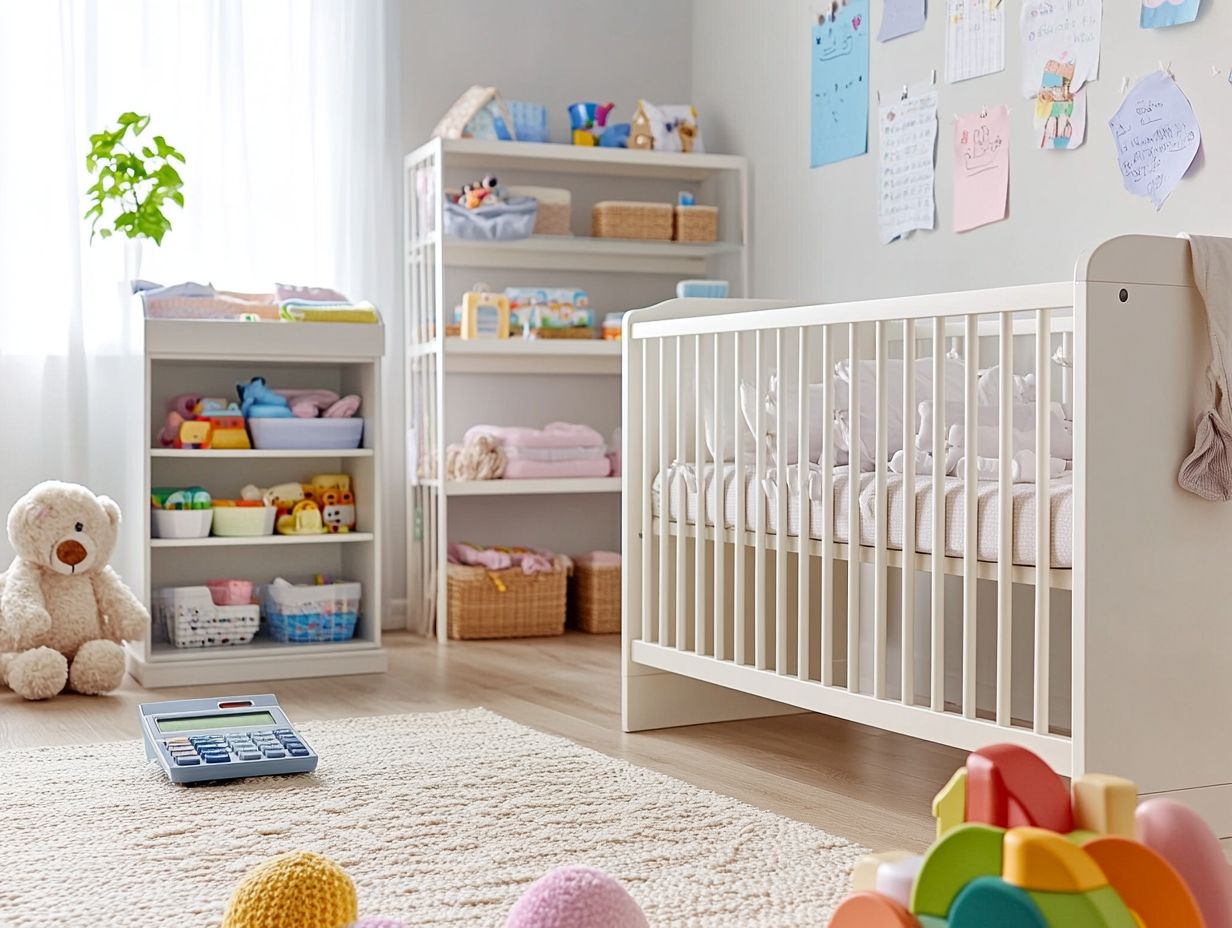
Basic necessities for your newborn, such as diapers, formula, and clothing, represent significant ongoing expenses that you should factor into your financial planning.
On average, you can expect to spend around $70 to $80 a month just on diapers, since these little ones tend to go through several changes each day. Formula can add another $100 to $200 monthly to your budget, depending on the brand and your feeding preferences. Clothing, often seen as a one-time expense, quickly accumulates, costing anywhere from $40 to $100 every few months as your infant grows at lightning speed.
By planning your spending effectively for these recurring costs, you can manage your family’s finances more smoothly, avoiding unexpected strains on your budget and ensuring that you can comfortably meet your baby’s needs.
Get ready for this exciting journey with confidence by planning wisely today!
Additional Expenses to Consider
Along with basic necessities, new parents should be aware of various additional expenses that can arise, such as childcare fees, education costs, and unforeseen emergencies.
Childcare can become a significant financial burden. Rates often fluctuate based on your location and the type of care you choose. Planning for future education is vital; many parents wisely opt to save through a 529 Plan, a savings plan that helps you save for your child’s education. This plan not only offers tax advantages but also helps secure your child’s academic future.
Having an emergency fund is equally crucial. It provides a cushion against unexpected financial shocks like medical expenses or urgent repairs. By preparing for these costs, you alleviate stress and lay a more stable foundation for your growing family.
Creating a Budget for Baby
Establishing a budget for your new baby is essential for sound financial planning. Take charge of your finances now and navigate expenses with confidence!
Step-by-Step Guide to Budgeting
A step-by-step guide to budgeting can empower you as a new parent to manage your finances effectively. By carefully evaluating your financial landscape, you can significantly reduce stress and enhance security during this pivotal life stage.
Start by compiling a detailed list of all your monthly expenses. Categorize them into essentials like housing and groceries and non-essentials, such as entertainment. This clear categorization allows you to visualize your spending habits and pinpoint areas to cut costs.
Consider leveraging financial planning resources from reputable organizations like InCharge Debt Solutions. These resources provide valuable insights into managing your expenditures effectively. This proactive approach not only helps you build a sustainable budget but also nurtures a healthier relationship with your finances.
Ways to Save Money on Baby Expenses
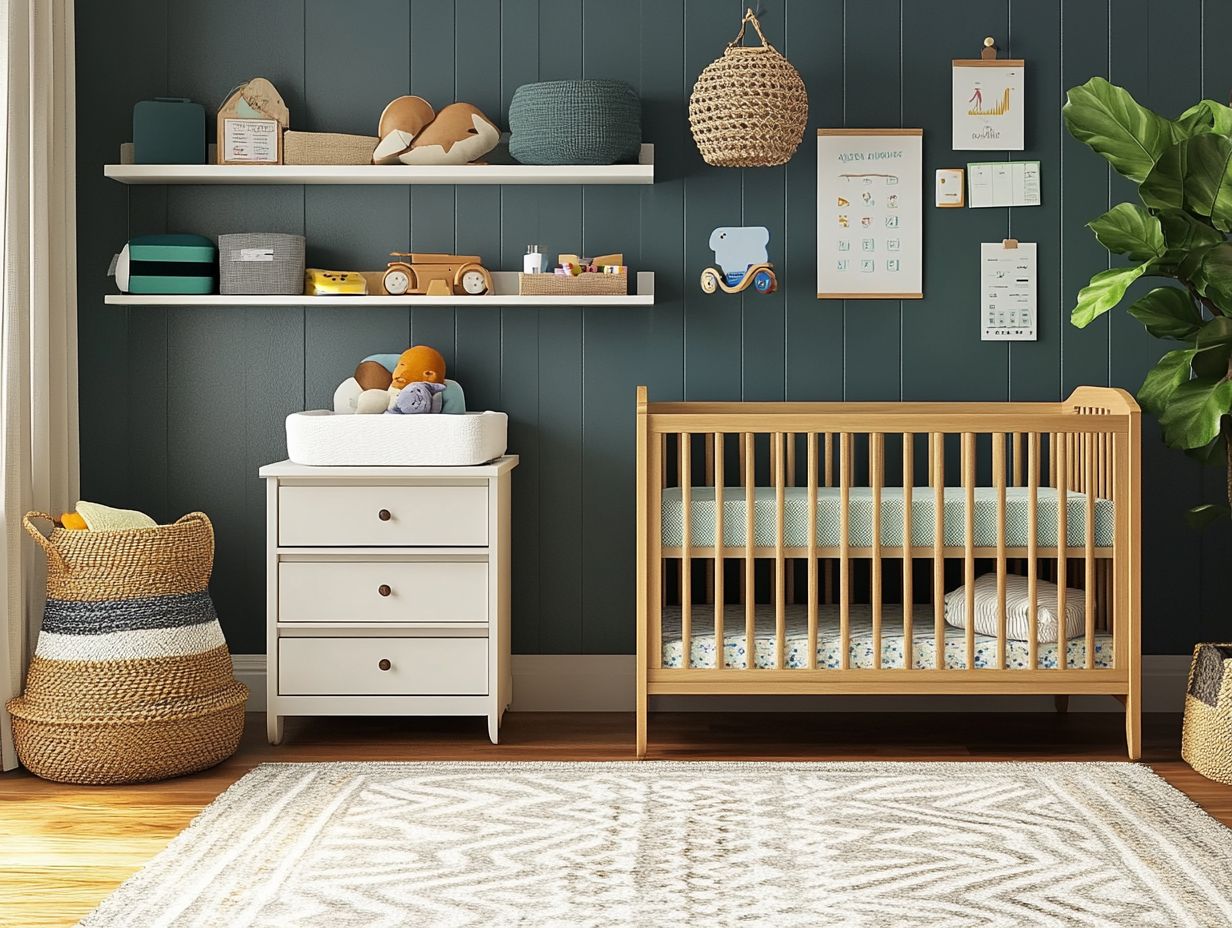
Discovering strategies to save money on baby expenses is essential for new parents. This approach allows you to manage your budget more efficiently while ensuring your child has everything they need for a happy and healthy upbringing.
Tips for Cutting Costs
Cutting costs on baby expenses can be achieved through various strategies that empower you to maintain a healthy budget without sacrificing your child’s needs.
For instance, buying in bulk can lead to significant savings on essentials like diapers and formula, allowing you to stock up and reduce those frequent trips to the store. Utilizing coupons can further enhance your savings, as many retailers and websites offer enticing discounts specifically for baby products. Additionally, 5 budgeting tips for single parents can help you make the most of your resources.
Explore government assistance programs for valuable financial relief. Programs like WIC (Women, Infants, and Children) offer nutrition assistance and other essential resources. Additionally, look into community initiatives, such as local baby supply exchanges or programs at community centers that provide free or reduced-cost items. These can help ensure your child receives quality care without straining your family budget.
Planning for Unexpected Expenses
Planning for unexpected expenses is an essential component of financial management for parents. Unforeseen costs can emerge at any moment during the early stages of parenthood, making it crucial for you to be prepared.
In summary, budgeting and planning for your new baby’s expenses is key to creating a secure financial future. Start budgeting today for peace of mind and stability as your family grows!
How to Prepare for Unexpected Costs
Preparing for unexpected costs means creating a financial buffer that gives you the power to respond swiftly without endangering your budget.
A smart strategy is to set aside a specific percentage of your income each month, allowing it to accumulate into a substantial emergency fund over time. You can pinpoint areas within your budget where small cuts can be made, like dining out less often or trimming back on subscription services. Redirect those savings into your fund.
Regularly reviewing your budget is also essential. Adjusting it as needed to accommodate unforeseen expenses ensures you maintain financial stability while nurturing a sense of security for your family.
Frequently Asked Questions
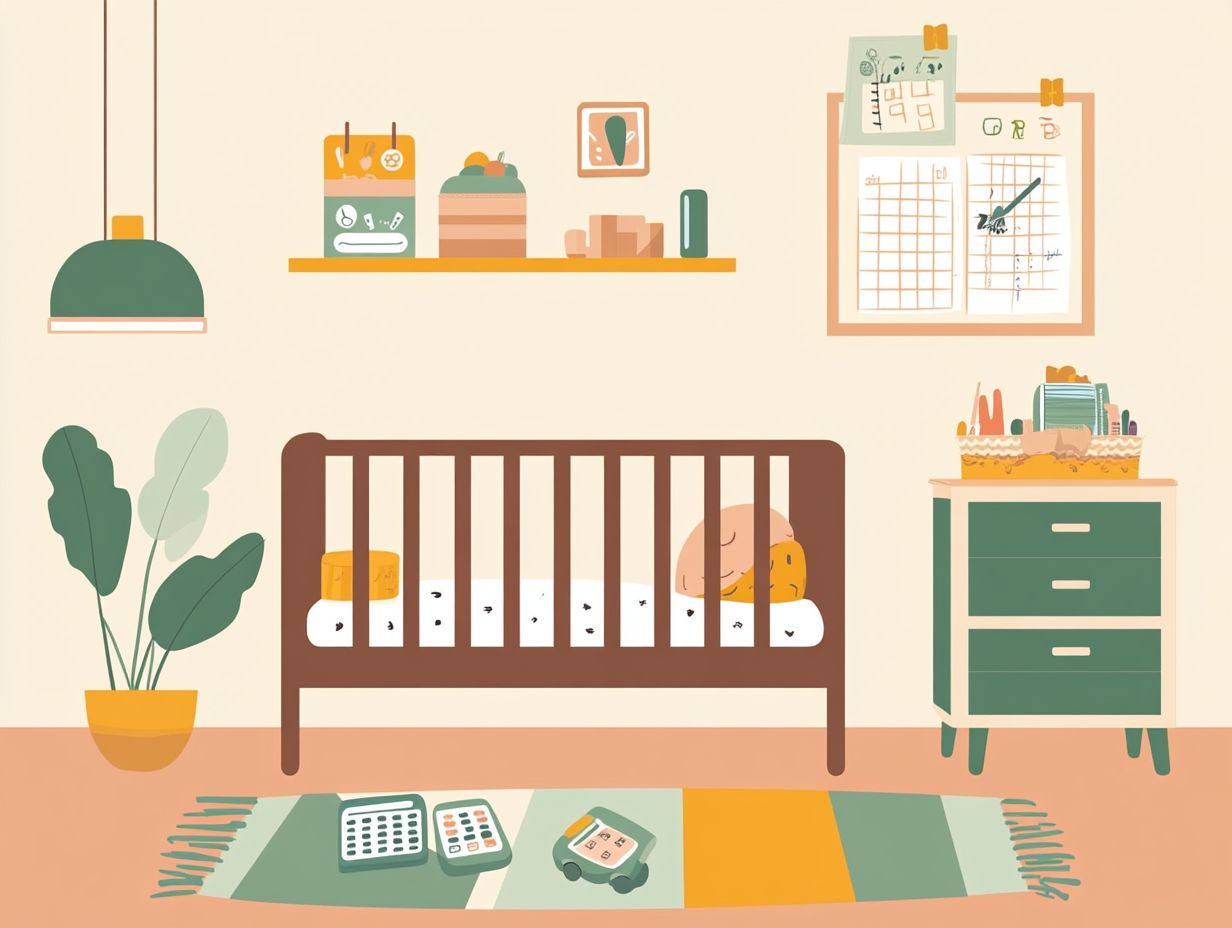
What are the essential expenses to consider when budgeting for a new baby?
Here are key expenses to consider:
When preparing for a new baby, it’s important to consider expenses such as diapers, formula or breastfeeding supplies, baby clothes, and medical costs. Other expenses to factor in could include childcare, baby gear such as a crib and stroller, and any necessary home renovations for a nursery. To effectively manage these costs, creating a family budget can help ensure you stay on track.
How can I save money on baby essentials?
You can also consider buying in bulk. Purchasing diapers, formula, and other supplies in bulk can often save you money in the long run. You might also save on a recurring expense by using cloth diapers instead of disposable ones.
What are some ways to cut costs when preparing for a new baby?
There are various ways to cut costs when preparing for a new baby. Look for gently used baby gear and clothes, borrow items from friends or family members, or shop at discount or thrift stores. You can also create a registry and ask for specific items you need as gifts instead of purchasing them yourself.
How can I create a realistic budget for my new baby?
To create a realistic budget for your new baby, start by writing down your current income and expenses. Then add the estimated costs for essential baby items and factor in any potential changes to your income or expenses once the baby arrives. Be sure to leave room for unexpected expenses.
What are some potential unexpected expenses to consider when budgeting for a new baby?
Unexpected expenses to consider could include medical costs, emergency childcare, or unforeseen home repairs. Make sure to have a robust emergency fund! It’s your safety net against surprises.
How can I stick to my budget once the baby arrives?
Act fast! Track your spending regularly to avoid going over budget. You may also want to consider using money-saving apps or setting up automatic transfers to a savings account dedicated to baby expenses. It’s also important to communicate openly with your partner about finances and make decisions as a team.






